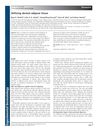 April 2016 in “Journal of Investigative Dermatology”
April 2016 in “Journal of Investigative Dermatology” Scientists have found a way to grow hair follicles from human cells in a lab, which could help treat hair loss and skin damage.
 August 2015 in “MOJ proteomics & bioinformatics”
August 2015 in “MOJ proteomics & bioinformatics” ePUKs could be valuable for regenerative medicine due to their wound healing abilities.
December 2009 in “생명과학회지” Thymosin β4 and VEGF are important for organ function and may help with blood vessel formation.
 February 2009 in “Journal of The American Academy of Dermatology”
February 2009 in “Journal of The American Academy of Dermatology” Fractional infrared technology is effective and safe for treating cervical laxity.

The treatment successfully integrated hair follicles into a dermal template, showing new hair growth and blood vessel formation.
 July 2003 in “Hair transplant forum international”
July 2003 in “Hair transplant forum international” The document's conclusion cannot be provided because the document is not available for parsing.
 December 2022 in “Acta Biomaterialia”
December 2022 in “Acta Biomaterialia” Corrections were made to a previous work on 3D printing a gel-alginate mix for creating hair follicles, but the main finding - that this method can help grow hair - remains the same.
November 2022 in “Regenerative Therapy” Advancements in tissue engineering show promise for hair follicle regeneration to treat hair loss.
 480 citations,
August 2014 in “Nature Biotechnology”
480 citations,
August 2014 in “Nature Biotechnology” Changing the environment around stem cells could help tissue repair, but it's hard to be precise and avoid side effects.
 316 citations,
June 2017 in “Stem Cell Research & Therapy”
316 citations,
June 2017 in “Stem Cell Research & Therapy” Fat tissue-derived cells show promise for repairing body tissues, but more research and regulation are needed for safe use.
 218 citations,
May 2014 in “Experimental Dermatology”
218 citations,
May 2014 in “Experimental Dermatology” Skin fat cells help with skin balance, hair growth, and healing wounds.
169 citations,
February 2018 in “Immunity” Inactive stem cells in hair follicles and muscles can avoid detection by the immune system.
 132 citations,
January 2017 in “International Journal of Molecular Sciences”
132 citations,
January 2017 in “International Journal of Molecular Sciences” Fat-derived stem cells show promise for skin repair and reducing aging signs but need more research for consistent results.
 97 citations,
May 2008 in “Journal of Cutaneous Pathology”
97 citations,
May 2008 in “Journal of Cutaneous Pathology” Different soft tissue fillers can cause various skin reactions; biodegradable fillers are safer and non-biodegradable ones like silicone can lead to long-term problems.
 90 citations,
February 2013 in “The Journal of Clinical Endocrinology and Metabolism”
90 citations,
February 2013 in “The Journal of Clinical Endocrinology and Metabolism” Women with PCOS have more body fat and thicker fat layers in certain abdominal areas than women without PCOS.
 83 citations,
March 2015 in “International Journal of Dermatology”
83 citations,
March 2015 in “International Journal of Dermatology” ADSC-CM treatment improved hair density and thickness in women with hair loss, safely and effectively.
 81 citations,
December 2009 in “Journal of Dermatological Science”
81 citations,
December 2009 in “Journal of Dermatological Science” Fat tissue stem cells may help increase hair growth.
 80 citations,
March 2000 in “Journal of cutaneous pathology”
80 citations,
March 2000 in “Journal of cutaneous pathology” The VVG stain effectively differentiates scar tissue from normal skin and helps classify types of permanent alopecia.
 70 citations,
February 2021 in “International Journal of Molecular Sciences”
70 citations,
February 2021 in “International Journal of Molecular Sciences” Fat-derived stem cells, platelet-rich plasma, and biomaterials show promise for healing chronic skin wounds and improving soft tissue with few side effects.
 69 citations,
December 2016 in “Facial plastic surgery”
69 citations,
December 2016 in “Facial plastic surgery” Different types of facial fat affect aging and treatment outcomes; more research is needed to enhance anti-aging procedures.
 69 citations,
September 1991 in “Journal of Surgical Research”
69 citations,
September 1991 in “Journal of Surgical Research” Understanding how fetal wounds heal could help improve healing in adults.
 58 citations,
January 2013 in “The Journal of Clinical Endocrinology and Metabolism”
58 citations,
January 2013 in “The Journal of Clinical Endocrinology and Metabolism” Obese women with PCOS show a male-like pattern in certain fat tissue gene expressions.
 46 citations,
January 2008 in “Journal of cosmetic dermatology”
46 citations,
January 2008 in “Journal of cosmetic dermatology” Caffeine and siloxanetriol alginate caffeine in emulsion form can reduce fatty cell size and number, potentially treating cellulite effectively.
 41 citations,
January 2020 in “BioMed Research International”
41 citations,
January 2020 in “BioMed Research International” Micrografts improve hair density and thickness without side effects.
39 citations,
May 2015 in “Advanced drug delivery reviews” MicroRNAs could improve skin tissue engineering by regulating cells and changing the skin's bioactive environment.
38 citations,
October 2005 in “Expert opinion on therapeutic patents” Selective androgen receptor modulators (SARMs) are a promising type of drug for various health conditions due to their targeted actions.
 34 citations,
July 1999 in “Journal of The European Academy of Dermatology and Venereology”
34 citations,
July 1999 in “Journal of The European Academy of Dermatology and Venereology” Iron deficiency is not a significant cause of hair loss in women.
 32 citations,
June 2003 in “The American Journal of Dermatopathology”
32 citations,
June 2003 in “The American Journal of Dermatopathology” Lipedematous scalp is mainly caused by an increase in fat tissue under the skin and is different from lipedematous alopecia.
 31 citations,
August 2015 in “Stem Cells Translational Medicine”
31 citations,
August 2015 in “Stem Cells Translational Medicine” Human skin can provide stem cells for tissue repair and regeneration, but there are challenges in obtaining and growing these cells safely.
























